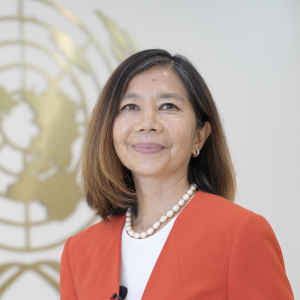International experience in reporting under the UPR Fourth Cycle
Opening Remarks by Ms. Pauline Tamesis
United Nations Resident Coordinator in Viet Nam
27th April 2023
Mr Pham Hai Anh, Director General of Department of International Organizations; Ministry of Foreign Affairs;
Excellencies;
Representatives from ministries, national partners, and development partners;
Dear colleagues from the UN;
Distinguished guests,
On behalf of the United Nations in Viet Nam, it is a privilege to join Director General Pham Hai Anh in welcoming you all to this workshop on the Universal Periodic Review (UPR).
Today we have a valuable opportunity to learn from each other. The Universal Periodic Review (UPR) is a unique process to regularly examine human rights records of all 193 UN Member States. It is a significant innovation of the Human Rights Council based on equal treatment for all countries. The UPR provides an opportunity for all States to declare what actions they have taken to improve the human rights situations in their countries and to overcome challenges to the enjoyment of human rights. Sharing of best human rights practices around the globe is embedded in the UPR. Currently, no other mechanism of this kind exists.
For creating the space to learn from each other, I thank the Ministry of Foreign Affairs and UNDP for co-organizing this event and to the Embassy of Norway for their generous support.
In the spirit of learning from each other, I take this opportunity to link the UPR with “rescuing” the SDGs.
How? [First point.] While the UPR is a state driven process, the crucial role of civil society in the mechanism is expressly recognised by the UN and its Member States and is highlighted in the resolution that establish the UPR. Since the UPR was introduced in 2007, civil society and NGOs have constantly engaged in the process: to achieve positive change for human rights across the world; and to support Governments in implementing the UPR recommendations.
We gather here today to learn more about the drafting of the National Report and the Stakeholders’ Submissions for the 4th Cycle of the UPR for Viet Nam, and to share experiences of NGOs, international representatives, and other stakeholders on participating in the UPR process. Ensuring meaningful and unhindered participation, free from intimidation and reprisals, of a broad range of civil society representatives in all stages of the UPR remains crucial to ensure fulfilment of human rights for all.
In the 3rd Cycle of the UPR, Viet Nam fully supported 220 out of 291 recommendations it received, an increase of 13% from the 2nd Cycle. Also worth noting is the increased participation of non-state actors with over 70 organizations contributing stakeholders' submissions, as compared with the 2nd UPR cycle. This positive trend encourages continued meaningful stakeholder participation in the 4th Cycle, starting with the 1st Consultation of the National Report, tentatively scheduled for June 2023.
Beyond acceptance of recommendations, implementation will be equally important, and to do so in complementarity with other international human rights mechanisms such as Treaty Bodies and Special Procedures. Similarly, quality of the stakeholders’ report matter more than the number of submissions.
[Second point] The implementation of UPR recommendations supports the achievement of the 2030 Agenda, and in turn SDG progress contributes to fulfilment of human rights. In Vietnam, when UPR recommendations are mapped against the SDGs, we see that 39% relate to SDG16 (peace, justice and institutions), 14% to SDG 1 (poverty), 9% to SDG 10 (inequality), 8% to SDG 4 (education), and 7% to SDG 17 (partnerships).
Viet Nam is also conducting its 2nd Voluntary National Review (VNR) of SDG progress this year, and gaps have been identified in the SDG implementation including lack of data to measure progress. Viet Nam is not an exception – globally, many Member States are off track to achieve the SDGs, and there is a strong and urgent call from the UN Secretary General to ‘rescue’ SDGs.
To 'rescue' the SDGs, it is imperative to strengthen the alignment between the UPR recommendations, the 2030 Agenda and key national frameworks and other relevant policies. With 39% of UPR recommendations related to SDG 16, ensuring a safe and inclusive civic space as a precondition unlocks the full potential of a whole-of-society approach.
The Secretary-General’s report on ‘Our Common Agenda’ described human rights as a “problem-solving tool for contemporary development challenges”. In this connection, the UPR can be a problem-solving tool. I also believe that there is a pressing need to incorporate innovation and foresight in our work going forward, especially towards ‘problem-solving’.
Our joint efforts are particularly important this year, as 2023 marks the 75th anniversary of the Universal Declaration on Human Rights (UDHR). In line with the Secretary-General’s ‘Highest Aspiration: A Call to Action for Human Rights’, today, we must continue to reaffirm the promise of the UDHR – ‘to uphold universal, indivisible and inalienable rights and fundamental freedoms for everyone, everywhere.’
The UN has launched Human Rights 75 Initiative, with many events and activities taking place in the course of the year to raise awareness about the UDHR and to reflect on achievements, best practices, and challenges with regard to the full realization of human rights for all, without discrimination of any kind. The initiative will culminate in a high-level event in December 2023 in commemoration of the 75th Anniversary.
At the Human Rights Council, Vietnam played an important role last month in sponsoring the resolution on the ‘Commemoration of the 75th anniversary of the UDHR’. I look forward to close engagement with the Government and people of Viet Nam in the implementation of this and other resolutions of the HRC.
I will close with great appreciation that in this room we gather many different voices of Viet Nam’s society – from Government agencies and academia to NGOs and international partners. I look forward to learning from all of you in our common aspiration of building a more equal and inclusive society for all. Thank you! Xin cam on!
Speech by



















